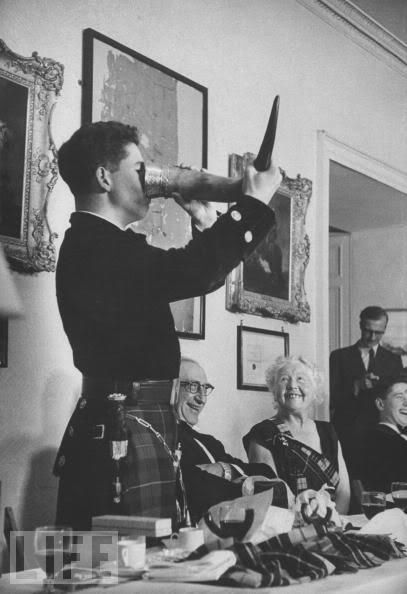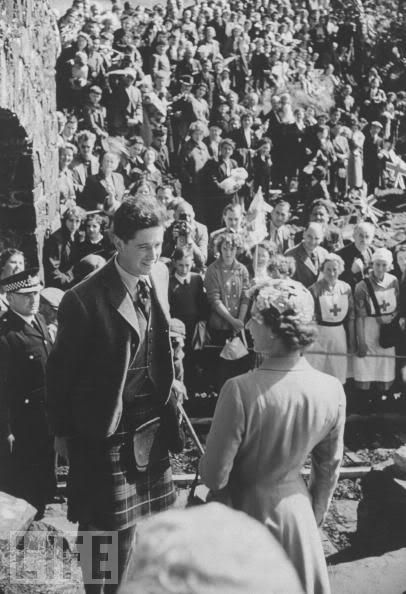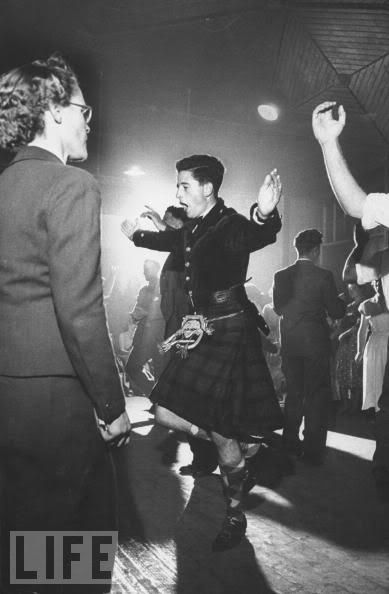|
-
10th November 09, 05:07 PM
#9
John MacLeod, Coming of Age Party 1956
The future chief of the MacLeod Clan, John MacLeod drinking at his coming of age party, August 1, 1956, with a visit from Elizabeth II, to boot.
His obituary from the Times Online, February 19, 2007:
February 19, 2007
John MacLeod of MacLeod
Affable clan chief who grappled with the irreconcilable anomalies of his Highland inheritance
August 10, 1935 - February 12, 2007
To succeed to the title of Chief of a Highland clan might sound, to modern ears, a romantic notion. For John MacLeod it was to prove a financial burden from which he never escaped. It came between him and his chosen career and it landed him in controversy — when he attempted to sell the Cuillin Hills on Skye to pay for repairs to the family castle.
Those who attacked him at the time for seeking to make money out of what was claimed to be the natural heritage of the Highlands, knew little of the man himself, the inheritance he had taken on, or the curious circumstances which had landed him with a title.
For those who did know him, however, he will be remembered for other things — his talents as a fine baritone singer, the chamber music festival which he and his former wife Melita started at Dunvegan Castle, the family seat on Skye, the diligence with which he fulfilled the ceremonial duties of a clan chief, and the enormous charm which won him the affection of the islanders.
A national newspaper advertisement pictured him once, dressed in his MacLeod kilt, head to head with a Native American chief, both of them laughing their heads off — a delightful image of two men fully aware of the anomaly of their positions but equally committed to fulfilling the obligations that went with them.
There was anomaly too in the circumstances in which MacLeod inherited the title. He and his younger twin, Patrick, and their elder brother, Robert, were born into the Wolrige Gordon family, of Esslemont near Ellon in Aberdeenshire, a country estate where they had an idyllic childhood.
Music played a significant part in their lives — John was a talented fiddler, Patrick played clarinet, both were members of the locally prestigious Kyle Laidlay Band. Their father, Robert, had married Joan Walter, one of two daughters of the formidable Dame Flora MacLeod of MacLeod, the 28th Chief, who had been married to Hubert Walter, whose family owned The Times.
The direct line had become extinct, and because Dame Flora had no male heirs, the Wolrige Gordon boys were declared by the Lord Lyon King of Arms to be heirs apparent to the title of Chief of MacLeod. Their father, who died when the twins were 4, had decided that his eldest son, Robert, should inherit Esslemont, and so the MacLeod title passed to John, who had been born a matter of minutes before his twin brother. He was just 16 and at Eton when he learnt not only that he would one day be Chief, but also that to ensure the inheritance, his name would be changed to MacLeod. As he once said: “A name is your whole identity. You don’t appreciate that until it has gone.”
By then he was developing into a talented singer, winning one of Eton’s top singing prizes. National Service intervened, and he joined the Black Watch, while Patrick went into the Ar-gylls, later pursuing a political career as Conservative MP for Aberdeenshire East. There followed a spell at McGill University in Canada, where MacLeod grew a massive black beard and began to take an interest in the theatre.
Returning to London, he set out on an acting career, first as a student, later a teacher at the London Academy of Music and Dramatic Art, where he was best male actor in the same year as Janet Suzman was best female.
It became clear to him, however, that singing was his greater talent, and he went to Geneva to study music seriously. In 1961 he married Drusilla, daughter of the actor Sebastian Shaw, but their marriage came to an end when she fell ill in London, and MacLeod stayed on in Geneva. They were later divorced.
It was while he was in Geneva that his eldest, though illegitimate, son Stephan was born; his existence was kept secret until many years later, but he has now assumed the name MacLeod, and is himself a talented musician. Meanwhile MacLeod had met Melita Kolin, a gifted pianist from Sofia, and they married in 1973. They had two children, Hugh and Elena.
In 1976 Dame Flora died at the age of 98, and MacLeod became the 29th Chief. He inherited the almost impossible tradition, which his grandmother had established, of attending clan gatherings all over the world, presiding over an annual “Macleod Clan Parliament”, and entertaining streams of MacLeods who came to pay homage to the grand old lady at the family seat of Dunvegan Castle, and to admire relics such as the famous Faerie Flag, which was said to have protected the MacLeods in battle, but was by now in a tattered state.
Dame Flora had showered love on her clanspeople but she had paid rather less attention to the finances of the estate.
MacLeod inherited 20,000 acres of mainly non-revenue producing assets in the form of mountain peaks, a stunning coastline, lochs, cottages and a castle whose vast, lead-lined flat roof and Victorian pepper-pot additions were developing into an environmental hazard and a financial nightmare. Managing the plastic buckets which caught the rain seeping through to the rooms below became one of his first and most persistent duties.
As heir apparent he had already embarked on a series of improvements on the estate, planning a modern visitor attraction, with the castle at its centre, building car parks, a restaurant, and a museum (which occupied two of Dame Flora’s staff bedrooms and caused her some annoyance). The reconstruction of the 18th-century castle gardens, carried out over several years, was a project of which he was particularly proud.
He and Melita established a small festival at Dunvegan, which drew musicians from across the world. But their separate careers meant that the marriage ended finally in divorce. Macleod spent more time in London, while still remaining dedicated to his role as chief. He was married once more, to Ulrike Tham.
The problem of the Dunvegan roof was never resolved. The plan to sell off one of the ancient MacLeod possessions, the Cuillin Hills, came to nothing, partly because of local opposition, partly because attracting a purchaser with £10 million to spend proved more difficult than MacLeod had envisaged.
Those who claimed that funds could be made available from various heritage bodies never managed to produce them. To the end, however, MacLeod maintained an optimistic outlook on life, entertaining guests at the castle with his repertoire of Scottish songs, taking friends on boat trips to see the seals, and attending to the duties which still go with the role of clan chief.
His warmth and enthusiasm won him many friends, but in the end the solution to the problems of his inheritance eluded him. This year he was found to have leukaemia, and he died after a short illness.
He is survived by his wives and three children. His son, Hugh, becomes the 30th Chief of the Clan MacLeod.
John MacLeod of MacLeod, 29th Chief of Clan MacLeod, was born on August 10, 1935. He died on February 12, 2007, aged 71
At any moment you must be prepared to give up who you are today for who you could become tomorrow.
-
Similar Threads
-
By Big Paul in forum How to Accessorize your Kilt
Replies: 11
Last Post: 3rd October 07, 06:21 PM
-
By angerli in forum General Kilt Talk
Replies: 17
Last Post: 1st February 07, 02:13 PM
-
By cessna152towser in forum Show us your pics
Replies: 3
Last Post: 22nd May 06, 05:25 PM
Tags for this Thread
 Posting Permissions
Posting Permissions
- You may not post new threads
- You may not post replies
- You may not post attachments
- You may not edit your posts
-
Forum Rules
|
|


















Bookmarks